Topic: Water
Intense precipitation events during the monsoon season in Bangladesh as captured by satellite-based products
Author(s):

IRI@AGU: Schedule of Events 2019
A range of IRI’s areas of expertise will be represented at this year’s annual meeting of the American Geophysical Union (AGU). Below is the schedule of IRI’s posters and presentations in sequential order. SUNDAY, DECEMBER 8 World Climate Research Programme 40th Anniversary Symposium Lisa Goddard WCRP is celebrating its 40th year of international climate science. We […]

IRI@AGU: Forecast-based Financing for Flash Floods
Forecasts are increasingly used to help reduce the impacts of floods in vulnerable communities. Not all floods are created equal, however. Flash floods are one of the most deadly types on a global scale. While early warning and early action systems for slow-onset floods (from rivers, for example) have improved significantly over the past 50 […]

IRI@AGU: Schedule of Events 2018
A range of IRI’s areas of expertise will be represented at this year’s annual meeting of the American Geophysical Union (AGU). Below is the schedule of IRI’s posters and presentations in sequential order. MONDAY Climate Services Research and Development: Adapting to Climate Today Lisa M Goddard is the primary convener for both a presentation and poster […]
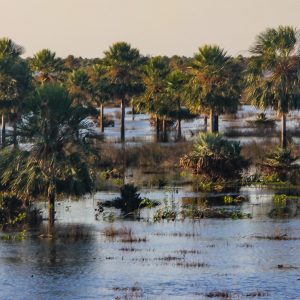
Nuevo Estudio Muestra Promesa en Pronóstico Subestacional de Lluvias Intensas en Sudamérica
Análisis de inundaciones en Paraguay durante El Niño 2015-16 examina influencia del clima a multiples escalas de tiempo Traducido por Ángel G. Muñoz El río Paraguay es una vena esencial para un país sin acceso al mar que comparte su nombre. Provee a los paraguayos irrigación para agricultura, acceso a navegación, y mejora la pesca. […]
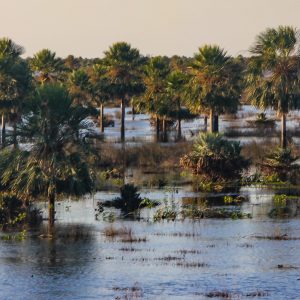
Study Shows Promise for Subseasonal Forecasts of Heavy Rain in South America
Analysis of Paraguay flooding event during 2015-16 El Niño examines influence of climate at multiple timescales The Paraguay River is an essential lifeblood for the landlocked country that shares it name. It provides Paraguayans with fishing, irrigation for agriculture and access to shipping. But it’s also prone to seasonal flooding, with especially high consequences for […]

IRI@AGU: Schedule of Events 2017
A range of IRI’s areas of expertise will be represented at this year’s annual meeting of the American Geophysical Union (AGU). One scientist will present on a tool for supporting decision making in agriculture. Another presentation focuses on improving our fundamental ability to predict tropical cyclones. Security under changing conditions is a major theme in […]
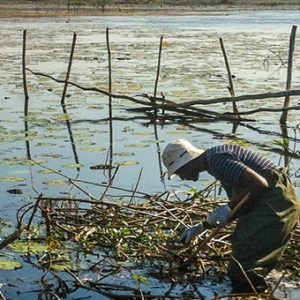
New Model Helps in Fight Against Deadly Parasitic Disease
IRI scientists and colleagues from South Africa are using satellites to detect seasonal water bodies that harbor schistosomiasis, the deadliest of the tropical neglected diseases Cole Porter romanticized the phrase in his 1936 song, but the probable origin of having someone — or something — under one’s skin is much less pleasant to consider. An […]
Nutrient losses in runoff water from contrasting crop rotations (in Spanish)
Author(s):
Tennessee utilities learn from drought, prepare for next dry year
— The Tennessean

IRI@AGU: Upmanu Lall on Improving Risk Management
Upmanu Lall is the director of the Columbia Water Center, a senior research scientist at IRI and the Alan & Carol Silberstein Professor of Engineering in the School of Engineering and Applied Sciences. In addition to other presentations at the 2016 American Geophysical Union Annual Meeting, Lall will be presenting, “Quantifying conditional risks for water and […]

IRI@AGU: Schedule of Events 2016
A range of IRI’s areas of expertise will be represented at this year’s annual meeting of the American Geophysical Union (AGU). Many of the presentations center on fundamental climate science, including analyses of the influence of climate variability and change on rainfall in the US, Iran, South America and the Sahel, as well as the […]
A normal rainy season likely
— The Hindu

Voices from CariCOF: Dry Season 2015-16
The Caribbean Climate Outlook Forum, also known as CariCOF, brings together climate scientists and meteorologists with decision-makers who may be able to use climate information. During the meeting, now held twice a year — once at the beginning of the dry season and once at the beginning of the wet season — the scientists present […]
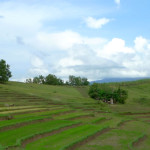
Climate Models and Food Security in the Philippines
By Megan Helseth The Bicol River Basin in the eastern Philippines is home to more than 5 million people, most of whom rely on agriculture and fishing for their livelihoods. The area is vulnerable to many climate and weather events, including typhoons, floods and dry spells. Each of these can have major impacts on local […]
The Winter Was Wet, but California Could Get Thirsty Again
— New York Times
Curbs Are Lifted, but Water Issues Remain for California
— World Archy
Add Lack of Freshwater to Island Dwellers’ Woes Under Climate Change
— Takepart
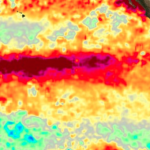
El Niño 2015 Conference Report
In November 2015, the International Research Institute for Climate and Society at Columbia University, in collaboration with the World Meteorological Organization, the U.S. Agency for International Development and the U.S. National Oceanic and Atmospheric Administration, convened the El Niño 2015 Conference. The report from this conference is now available. In addition to recordings and summaries of the […]
Angat Dam water supply to survive El Niño
— Sun Star
Korean agency sees surplus monsoon for India
— Hindu Business Line
IRI@AMS 2016: Schedule of Events
From crowd-sourcing tornado data to teaching Harlem high-school students about climate change and climate justice, IRI scientists will be sharing a number of fascinating projects at the annual meeting of the American Meteorological Society (AMS) next week in New Orleans. Below is a schedule of their presentations and posters. Presenting authors appear in bold. Crowd-Sourcing the Storm: A New […]

IRI@AGU: Schedule of Events 2015
The IRI has seven scientists and staff presenting on a wide range of topics at the American Geophysical Union (AGU) Meeting this year. Andrew Robertson and Alexis Berg will present advancements in our fundamental understanding of earth’s systems. Eunjin Han, Pietro Ceccato and Pradipta Parhi will discuss methods for using our climate knowledge for applications in agriculture, health and […]
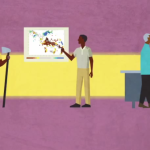
Climate Resilience (Animation)
Climate resilience: it’s the ability for communities to recover from the impacts of climate events. It’s the difference between weather being manageable…or a catastrophe. But for many parts of the world, where livelihoods depend so much on the climate, critical weather and climate information is unavailable or unusable. The International Research Institute for Climate and […]
Namibia: City Cracks Whip On Water Crisis
— AllAfrica.com

El Niño Drives Drought in the Philippines
A strong El Niño event is in place in the tropical Pacific. IRI’s seasonal forecast for the October-December 2015 period, based on the most recent sea surface temperature projections, predicts a strong likelihood of below-average precipitation for regions in the western equatorial Pacific, including much of the Philippines. The strong likelihood of reduced rainfall during […]
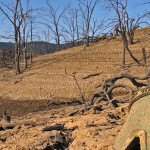
California Drought: Happy New Year?
Using the IRI Data Library to Predict and Track the 2016 Water Year This post is an excerpt from a story published by IRI on Medium.com, where we are updating the post each month with the latest forecasts. View the full story and forecast maps here. October 1st marks the first day of the new “Water Year” for […]
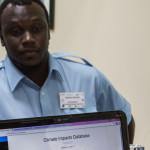
Minds on the Information Gap: Climate in the Caribbean
This post is an excerpt from a multimedia story published by IRI on Medium.com. View the full story and video series here. On the road from Hewanorra airport in southern St. Lucia to the capital in the north of the island, a bridge is missing, washed out during heavy rains on Christmas Eve, 2013. A sharp […]
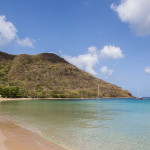
New Discussion Briefs: Water & Climate in the Caribbean
In partnership with the Centre for Resource Management and Environmental Studies (CERMES) at the University of West Indies, the International Research Institute for Climate and Society has released a set of four discussion briefs related to water and climate in the Caribbean. The briefs are designed for policy makers and others who work in the water sector to learn more about […]

NASA@IRI: Studying Climate Extremes from Space
By Alex Sweeney Peering into the satellite control rooms at NASA’s Goddard Space Flight Center (GSFC) last month was extremely exciting. As participants of the NASA DEVELOP National Program, we use satellite data every day in our research. Helen Cen and I had just finished our end-of-term presentations with other DEVELOP participants and were led […]
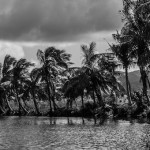
One Size Fits None: Drought forecasting in the Caribbean
This post contains excerpts from the full version on our Medium account. Most extreme climate and weather events involve an unwanted surplus — too much rain, too much wind or too much snow and ice. Drought is a little different: it’s the absence of something. It takes time for a drought to build, making it fundamentally different to monitor […]
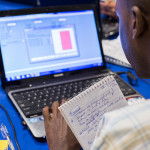
#WorldMetDay: Climate Knowledge for Climate Action
Today is World Meteorological Day, this year themed Climate Knowledge for Climate Action. Since this is basically the name of our game here at the International Research Institute for Climate and Society, we thought we’d share some of our recent, related activities. Working with the World Meteorological Organization Earlier this month, Rupa Kumar Kolli, Chief of the World […]
Many in US Face Another Dry Year as World Water Day Arrives
— NBC News
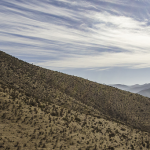
Video: Managing Water in a Dry Land
The Elqui River valley lies in Chile’s northern, mountainous Coquimbo region, which is extremely dry. The region receives only about 100 millimeters (4 inches) of rain each year, and most of it during one short rainy season. The rainfall is also highly variable and driven in large part on El Niño and La Niña fluctuations. In some years, […]

Looking back: A year of forecasts, partnerships and climate information
by Manon Verchot In 2013, the International Research Institute for Climate and Society teamed up with the University of Arizona to help regions of the world that are most vulnerable to climate variability and change. Here’s a look at what has been accomplished so far. Farmers are at the mercy of the weather. They need […]
Parts of California brace for rain
— Central Valley Business Times
IRI@AGU: Mapping the Sahel’s Re-greening
Headed to AGU? Find the full schedule of IRI staff presenting here. The Sahel region, just south of the Sahara Desert, stretches across Africa from the Atlantic Ocean to the Red Sea. The persistent drought and resulting famines that pummeled the region in the 1970s and 80s were for decades blamed on local societies – on […]
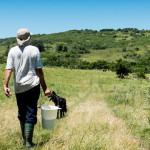
Fourth International Conference on Climate Services
The Climate Services Partnership is pleased to announce the fourth International Conference on Climate Services (ICCS 4), which will be held in Montevideo, Uruguay. The event starts this Wednesday, December 10 at 10:30 am UTC and runs through Friday, December 12, 2:30 pm UTC. ICCS 4 is being hosted by the Uruguayan Ministry of Agriculture, […]

IRI@AGU: Schedule of Events
The IRI has a record thirteen scientists and staff presenting at the American Geophysical Union (AGU) Meeting this year. Below is the schedule of events for those presenting, organized by theme and with links to additional information about their research. CLIMATE & HEALTH Climate and Population Health Vulnerabilities to Vector-Borne Diseases: Increasing Resilience Under Climate […]
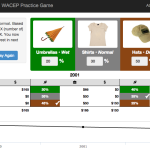
Water and Climate Courses in the Caribbean
This article is a modification from a post by the Columbia Center for New Media Teaching and Learning. This month, students completed the final course in a series of four online courses that address the ongoing societal challenges of managing water resources under the pressures of climate change and variability. Early in 2014, the Water and Climate Education Program […]
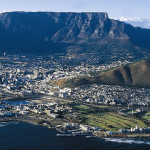
IRI’s Role in South Africa’s Seasonal Climate Forecast Operations
Several decades of climate research have shown seasonal temperature and rainfall patterns over southern Africa to be predictable months in advance. While scientists recognized the importance of the El Niño Southern Oscillation on seasonal climate variability in this region during the 1980s, South Africa first began issuing regular seasonal forecasts in the early 1990s. Over the past twenty years, enhanced modeling systems have […]
What Will Winter Hold for Drought-Plagued California?
— Climate Central
One of Sao Paulo’s Biggest Reservoirs Is Nearly Dry
— Climate Central
Investigating El Niño-Southern Oscillation and society relationships
Author(s):
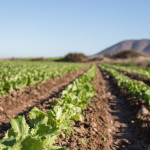
Study: El Niño’s Impacts on Water, Agriculture and Health
By Ben Orlove and Ángel Muñoz A new study examines the degree to which decision makers working in key sectors–agriculture, water and health–have been able to make successful use of forecasts of El Niño and La Niña. We find that these forecasts have indeed often been put into use, but only when two conditions have been […]

Live from Kingston: It’s CariCOF
By Elisabeth Gawthrop and Mea Halperin The Caribbean Climate Outlook Forum (CariCOF) took place yesterday in Kingston, Jamaica. It is one of a number of Climate Outlook Forums (COFs) around the world during which scientists present a forecast to decision makers who work in climate-sensitive sectors such as agriculture, water management, disaster planning and health. The forecast […]
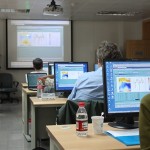
Q&A – Why care about CariCOF?
Next week, the Caribbean Climate Outlook Forum (known as CariCOF) will kick off in Kingston, Jamaica. At this event, both providers and users of climate information from across the Caribbean will discuss the upcoming season’s forecast and the ways the forecast might be used to make decisions in water resources, tourism and disaster risk management. To learn […]

Water and Climate Courses in the Caribbean
This article is a modification from a post by the Columbia Center for New Media Teaching and Learning. In the Caribbean, most states rely on a single source of water for all domestic, agricultural and industrial needs. Variations in rainfall brought on by climate change add to the challenge of managing this limited resource. Furthermore, there […]
How climate modelers became calendar models
— The Plainspoken Scientist, AGU

IRI@AGU: Bridging the Climate-Weather Gap
This post is the last in a series of five Q&As with scientists from the International Research Institute for Climate and Society who will be presenting their work at the annual meeting of the American Geophysical Union in San Francisco December 9 to 13. Not all climate forecasts are created (and researched) equally, something that climate scientists […]
Plagues and Pleasures on the Salton Sea
— World Channel
Assessment of Land Surface Moisture in Semi-Arid Sahel from Seasonally Detrended Shortwave Infrared Reflectance Data.
Author(s):
Photo essay: Adapting to climate change in arid Chile
— EarthSky
Singing the Blues About Water Scarcity
A version of this post originally appeared on the Climate and Society Hot Topics blog. Otis Redding wraps up his acclaimed 1965 album Otis Blue with “You Don’t Miss Your Water.” The refrain “you don’t miss your water ’til your well runs dry” was originally written by William Bell and inspired by his feelings of homesickness for his native Memphis […]
Rising Tides and Shrimp from the Banks of the Amazon Forest
A team of scientists from the Earth Institute, including IRI’s Katia Fernandez, have come to the Amazon delta to find out how communities are adapting. The researchers want to understand how the climate is changing, and how they can help with better forecasting and strategies for adaptation as part of a project titled, “Socio-Cultural Adaptations of […]
An unmixing algorithm for remotely sensed soil moisture
Author(s):
A simple mechanism for the climatological midsummer drought along the Pacific coast of Central America
Author(s):
Changes in the character of precipitation in Burkina Faso associated with late-20th century drought and recovery in the Sahel
Author(s):
Diagnostics of Western Himalayan River Flow: Warm Season (MAM/JJAS) Inflow into Bhakra Dam in India
Author(s):
Extracting subseasonal scenarios: An alternative method to analyze seasonal predictability of regional-scale tropical rainfall
Author(s):
Dynamical structure of extreme floods in the U.S. Midwest and the UK
Author(s):
Improving the Water Outlook in the Himalayas
Andrew Robertson, a climate scientist at the International Research Institute for Climate and Society, discusses his research on helping reservoir managers in northern India make better planning decisions by improving their ability to predict how climate change will influence water availability. In order to do this, Robertson worked with colleagues at the Columbia Water Center and the […]
Twentieth-Century Summer Precipitation in South Eastern South America: Comparison of Gridded and Station Data
Author(s):
The Role of Drought in the Horn of Africa Famine
Let’s get this out of the way. The current famine in the Horn of Africa isn’t caused by drought. Rather, a complex mix of societal and political factors created a dangerous situation.The worst drought in 60 years is what pushed that situation over the edge into a humanitarian crisis. However, just as these social factors were […]
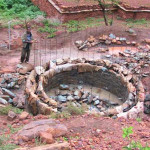
Managing Ethiopia’s Water Resources
IRI’s Paul Block describes his recent trip to Koraro, Ethiopia, where there is a cluster of 11 Millennium Villages. Block is working to improve agricultural water management in the area, which is one of the most impoverished in the country and suffers from very poor infrastructure and severe drought. This project has been made possible […]

You must be logged in to post a comment.